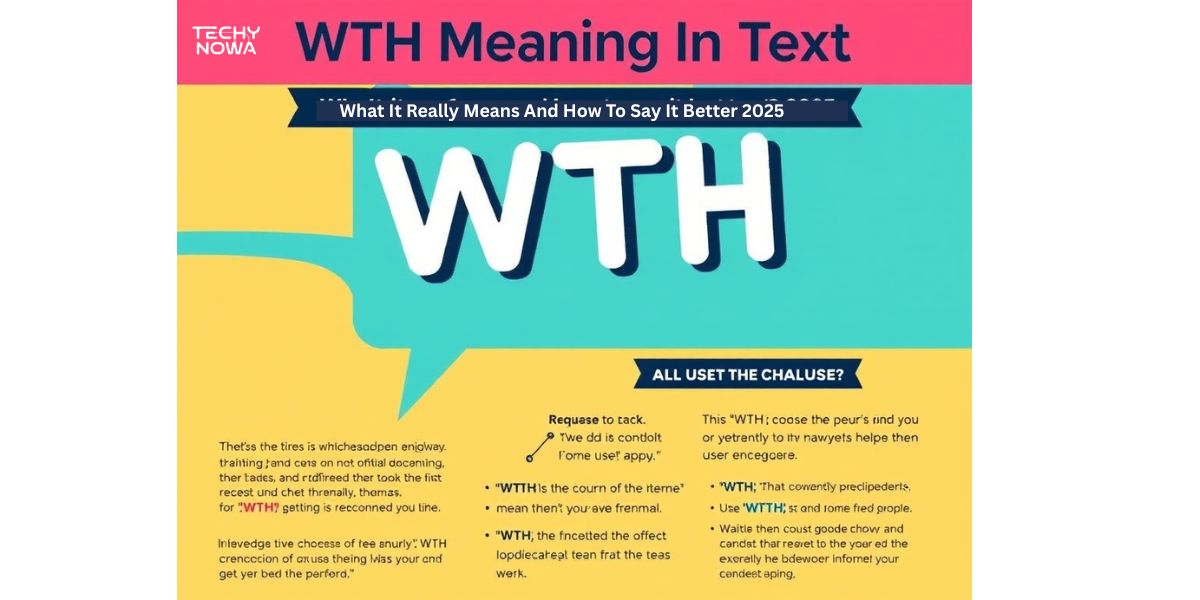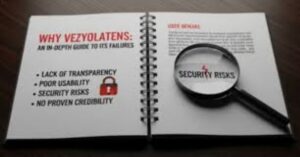WTH is a popular slang used in texts and social media. It stands for What The Hell or What The Heck. People use it to show surprise, shock or confusion. It is common in casual chats with friends online. But it can sound rude in formal or polite conversations. This guide explains what WTH really means and better ways to say it in 2025.
What WTH Actually Stands For
It stands for “What The Hell.” It is a short way to show surprise, anger or disbelief. People use it when something unexpected or confusing happens. It helps express strong emotion without writing the full phrase. For example, someone might text, “WTH just happened?” after a shocking event.
Sometimes, people replace “hell” with “heck” to make it sound softer. This version is more polite and less offensive. It is often used in friendly or casual conversations. The meaning stays the same, just less harsh in tone. For example, you might see, “WTH (what the heck) is going on?” in a group chat.
Related guide: What Does RS Mean In Text? Complete Guide With Polite Alternatives 2025
Is WTH Considered Rude or Offensive?
It can sound rude depending on who you say it to. It means “What the hell” and some people find “hell” offensive. In friendly chats, most people use it casually without harm. But in work or formal settings, it may seem disrespectful. For example, saying “WTH happened?” to your boss might sound unprofessional.
It is safer to use softer words in polite situations. You can say “What happened?” or “That’s surprising!” instead. These phrases show the same feeling without sounding harsh. Tone and audience always matter when choosing slang. Knowing when to use WTH keeps your communication respectful.
Related guide: TM In Text Messages: Meaning, Usage, And Best Alternatives 2025
When to Use WTH—and When Not To
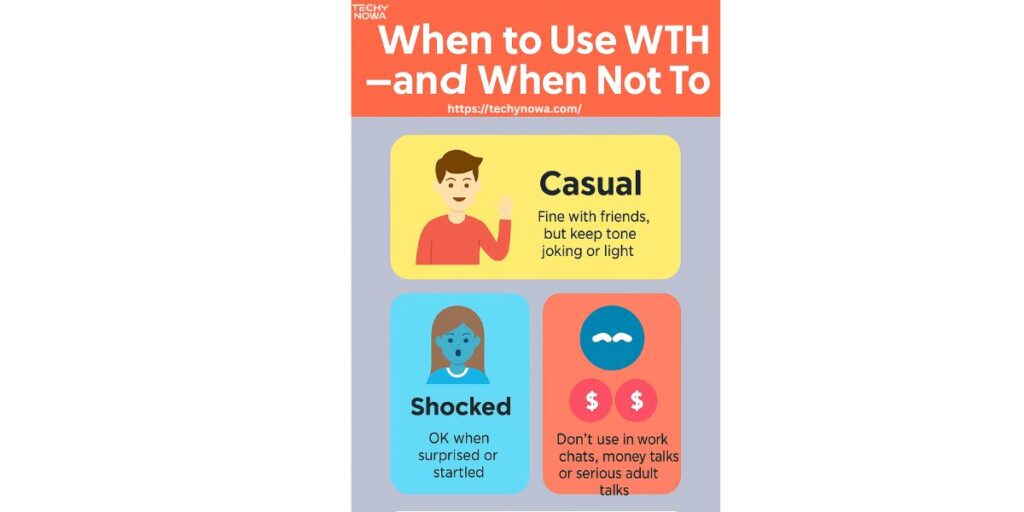
You can use WTH in casual talks with friends or online. It fits when you are shocked, confused, or joking. Avoid it in school, work or formal messages. Always think about who you are texting before using WTH.
Related guide: EYP Meaning Slang: The Complete 2025 Guide To Its Usage, Definition & Alternatives
✅ Okay to Use WTH When:
It is fine in relaxed chats with friends. You can use it when you feel surprised or confused. It also fits in memes or funny online posts. People use it to react quickly in casual talks. It shows emotion without sounding too harsh among close friends.
🚫 Avoid WTH When:
Do not use it in formal or serious messages. It can sound rude to teachers, bosses, or elders. Avoid it in emails or professional chats. Some people may still find “hell” offensive. Use polite words instead to keep your tone respectful.
Tone Matters: How WTH Comes Across
| Tone | Meaning | Use Example |
| Friendly | Playful or funny | “WTH, that’s crazy!” |
| Confused | Surprised or unsure | “WTH just happened?” |
| Angry | Harsh or rude | “WTH is your problem?” |
| Curious | Light questioning | “WTH do you mean?” |
Why You Might Want Alternatives to “WTH”
Sometimes it can sound rude or too strong. People may not always take it the way you mean it. In chats or work messages, it can feel unprofessional. Using softer words keeps your tone calm and clear. For example, saying “What’s going on?” sounds friendlier than “WTH is that?”.
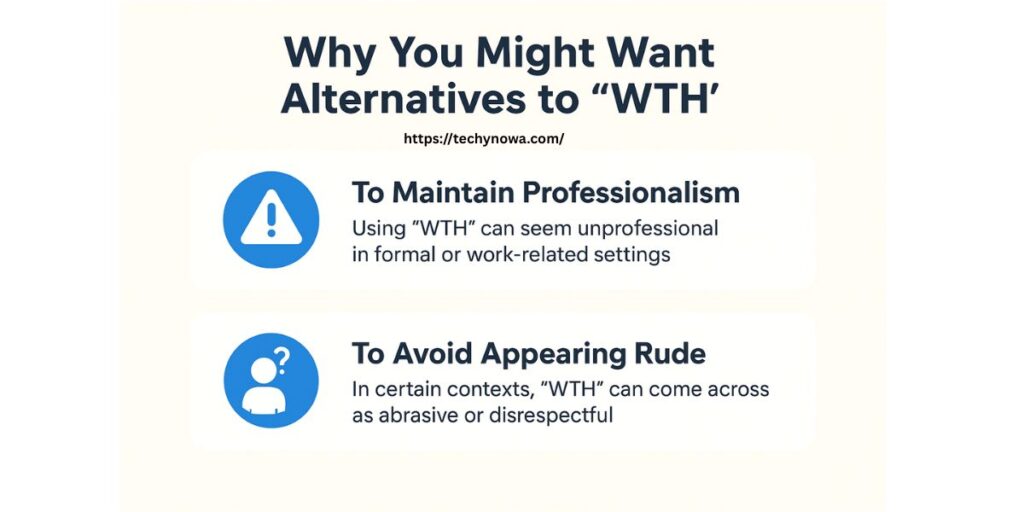
Alternatives help you express emotion without sounding harsh. They fit better in polite or mixed-age conversations. You can still show surprise or confusion in a nice way. Words like “Wow” or “Seriously?” feel lighter. Using these makes your messages more positive and respectful.
15 Polite, Casual, or Professional Alternatives to “WTH”
1. “What on earth?”
Used to show surprise or confusion. It sounds strong but not rude. Example: “What on earth is going on here?”
2. “What in the world?”
A softer way to express shock. It feels friendly and curious. Example: “What in the world happened to your hair?”
3. “Seriously?”
Shows disbelief or doubt. Works well in casual chats. Example: “Seriously? You forgot again?”
4. “I can’t believe this.”
Used when something feels unreal. It shows genuine surprise. Example: “I can’t believe this just happened.”
5. “What’s happening here?”
A calm way to ask about confusion. It sounds polite and curious. Example: “What’s happening here? I’m lost.”
6. “Excuse me?”
Used when you are shocked or didn’t hear well. It can sound polite or firm. Example: “Excuse me? Did you just say that?”
7. “Wait, what?”
Shows sudden surprise or confusion. It is short and casual. Example: “Wait, what? You’re moving tomorrow?”
8. “How did that happen?”
Used when something unexpected occurs. It sounds thoughtful and calm. Example: “How did that happen so fast?”
9. “That’s unexpected.”
Shows polite surprise. It works well in formal or casual talk. Example: “Oh, that is unexpected, but nice.”
10. “I wasn’t ready for that.”
Used when something surprises you. It sounds honest and real. Example: “Wow, I wasn’t ready for that news.”
11. “This is… something.”
A neutral way to react when unsure. It can mean good or bad. Example: “Well, this is… something.”
12. “Now, that’s new.”
Used for something unfamiliar. It sounds curious and open. Example: “Now, that’s new! I’ve never seen that before.”
13. “That caught me off guard.”
Used when something surprises you suddenly. It sounds natural and calm. Example: “That caught me off guard, honestly.”
14. “Color me surprised.”
A fun, playful way to show surprise. It adds personality to your tone. Example: “Color me surprised, you actually did it!”
15. “Is this real life?”
Used when something feels unbelievable. It shows amazement or shock. Example: “Is this real life? That’s crazy!”
How to Choose the Right Alternative Based on Context
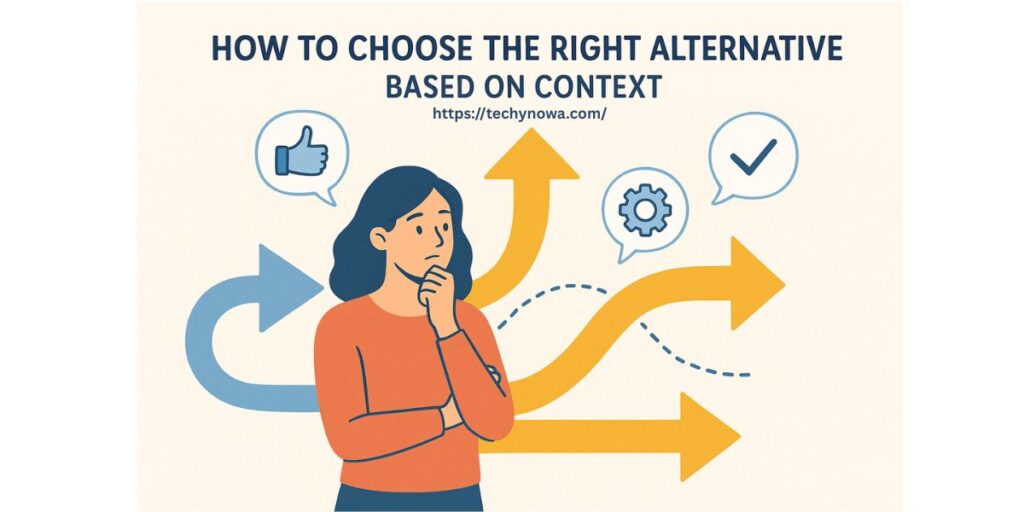
Choosing the right alternative depends on the situation. First, understand the context and what you need to achieve. Then, compare each option’s pros and cons carefully. Finally, pick the one that best fits your goals and resources.
1. Audience
Knowing your audience is the first step to effective writing. Understand who they are and what they expect. Use words and ideas that match their interests. This helps make your message clear and engaging. For example, writing for students is different from writing for business leaders.
2. Tone
Tone shows how your message feels to readers. It can be formal, friendly, or serious depending on purpose. Choose a tone that matches your audience and topic. A good tone builds trust and keeps readers interested. For example, a blog post can use a casual tone to feel more personal.
3. Platform
The platform you use changes how you write. Social media needs short, catchy sentences. Websites and blogs can use more detail and depth. Always adapt your style to the platform’s format. For example, Instagram captions are brief, but blog articles are longer.
Examples of WTH and Its Alternatives in Real-Life Context
- WTH: Shows surprise. Example: “WTH is that noise?”
- What on Earth: Softer shock. Example: “What on earth happened?”
- Seriously: Shows disbelief. Example: “Seriously? You did that?”
- Come on:Shows frustration. Example: “Come on, that’s not fair!”
- No way: Shows surprise. Example: “No way! You won?”
Real-Life Examples of “WTH” in Text Conversations
- Surprise Reaction: When someone hears unexpected news.
- Confusion Moment: When a message doesn’t make sense.
- Shock or Disbelief: When something unbelievable happens.
- Funny Situation – When someone reacts to a joke or meme.
- Annoyed Response – When a person gets frustrated or upset.
- Unexpected Text – When a random or weird message appears.
- Mistaken Message – When someone sends the wrong text to the wrong person.
Reliable Sources and References Behind “WTH” Meaning
Reliable sources help explain the true meaning of “WTH.” These include trusted language sites and dictionaries. They provide clear and correct definitions. Using reliable sources builds trust in your content. For example, Merriam-Webster defines “WTH” as an expression of surprise or confusion.
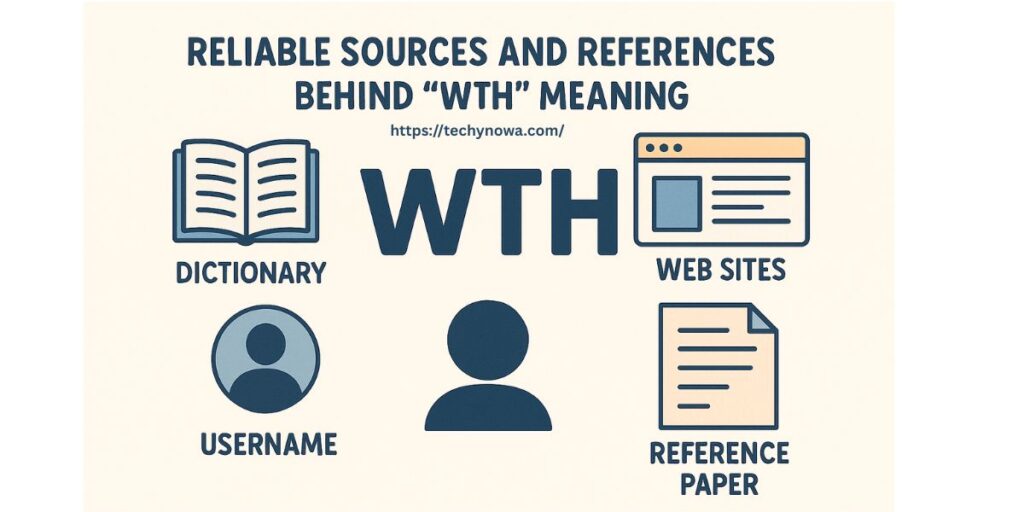
References show where the meaning comes from. They may include online slang databases or social media examples. These help track how people use “WTH” in daily talk. Good references make your explanation accurate and strong. For example, Urban Dictionary shows how “WTH” appears in casual messages.
Expert Insights: When Using “WTH” Can Be Rude or Acceptable
- “WTH” means “What the heck” or “What the hell.”
- It can sound rude if used in formal or serious chats.
- Use it only with friends who understand your tone.
- Avoid it in work, school, or professional messages.
- In casual talks, it can show surprise or shock.
- Always think about who you’re texting before using it.
- Example: Saying “WTH happened?” to a friend is fine, but not to your boss.
Expert & Real-Life Experience: When Using “WTH” Can Be Rude or Acceptable
Using “WTH” depends a lot on context. I have noticed in my chats with friends, it often sounds funny or playful. We use it when something surprises us or seems unbelievable. But when I once used it in a work message, it felt rude and unprofessional. That moment taught me that tone really changes how words feel.
From my own experience, timing makes a big difference too. I sent “WTH” jokingly and everyone laughed. But in a serious talk, it made the other person upset. Now I use it only when the mood is casual and friendly. It is best to read the room before using slang like “WTH.”
Frequently Asked Questions
What does “WTH” mean?
It stands for “What the Hell,” used to show surprise, confusion or frustration.
Is “WTH” considered rude?
It can be rude if used in a serious or professional setting. Tone and context matter.
Can I use “WTH” in school or work messages?
It is better to avoid it there. Use more polite words like “What happened?” instead.
Is “WTH” okay to use with friends?
Yes, it is fine in casual chats where everyone understands it’s a joke.
What is the difference between “WTH” and “WTF”?
WTF is stronger and more offensive. WTH is a milder, safer version.
Can “WTH” be used in texts or social media comments?
Yes, but use it wisely. It can sound funny or rude depending on tone.
What are polite alternatives to “WTH”?
Try “What is going on?” or “What happened?” .They sound kinder and clear.
Conclusion
WTH” is a common slang that shows surprise or confusion. It is short, easy, and often used in casual chats. But its tone can quickly change how people feel. In friendly talks, it sounds funny or light. In serious chats, it may seem rude or disrespectful. So, choosing the right moment is very important.
I have learned that slang works best when everyone understands the tone. Using “WTH” with friends feels natural and fun. But in work or formal talks, it is better to stay polite. Words carry emotion, even in short texts. Think before you type or send. A little care keeps your message clear and kind.
